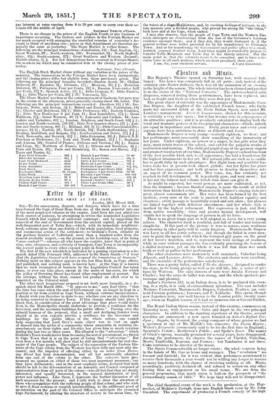ttrotrro ant 3Ettoir.
Her Majesty's Theatre opened on Saturday last, with unusual bril- liancy. The house was completely full in all parts ; and, instead of the ordinary ante-Easter dullness, there was all the animation of an evening in the height of the season. The whole interior has been cleaned and purified from the stains of the " National Concerts." The amber-coloured satin draperies, removed during those performances, have been replaced, and look as bright and fresh as when they were first put up.
The great object of curiosity was the appearance of Mademoiselle Caro- line Duprez, the daughter of the celebrated French tenor ; who lately made her successful &Hit at the Paris Italian Opera, now under Mr. Lumley's management. Lucia di Lammermoor, chosen for this occasion, is certainly a very trite opera ; but it has become trite in consequence of its attractive qualities ; and it is peculiarly calculated to display both the vocal and dramatic powers of its two principal characters—which, indeed, are equal in importance and interest. Every great tenor and every great soprano have been ambitious to shine as Edgardo and Lucia.
Mademoiselle Duprez is very young—scarcely eighteen, we bear ; and her performance must necessarily show something of the immaturity of her years. Under eighteen, an actress or a singer, be her gifts what they may, must retain traces of the school, and exhibit the palpable results of instruction and training. The child and pupil of ono of the greatest singers and greatest vocal actors of our time, Mademoiselle Duprez's school has been of the best possible kind, and, to all appearance, has laid a foundation for the highest attainments in her art. Iler natural gifts are such as to enable her to profit fully by such advantages. Her slight form and youthful fea- tures make her at present look almost girlish ; but her figure has grace and her face expression ; and both promise to develop themselves into an aspect Of no common power. Her voice, too, has evidently not reached its full development. It is perfectly pure, and very tweet ; but it has not the fulness and volume which time alone can give it.
As might be expected, her vocal powers are more cultivated, as yet, than the dramatic; because finished singing is more the result of skilful instruction than finished acting. Mademoiselle Duprez's singing indicates great, almost consummate art. Her voice has been formed by the best method ; every note of the scale is emitted with faultless equality and clearness ; every passage is beautifully round and articulate ; her phrases are linked together with delicious smoothness; and her whole style is marked by the highest refinement. IIer expression is just, and flows from native sensibility : time, and greater mental development, will enable her to speak the language of passion in all its force.
There is no great tragic part so well adapted as Lucia for a very young actress. The character itself is youthful, and full of tender and innocent simplicity. If this part of the picture is true to nature, some weakness of colouring in other parts will be easily forgiven. Mademoiselle Duprez was Lucy in all her gentle softness ; and though she failed in some mea- sure to paint the agony with which the betrayed girl gazes on the proof of her lover's desertion, and to represent the wild ravings of madness, while in sonic violent passages she was evidently practising the lessons of a skilful instructor, yet on the whole it was felt that there was much truth as well as pathos in her performance.
The other characters were moderately well sustained ; Calzolari being Edgard°, and Lorenzo Ashton. The orchestra and chorus were excellent, and the ensemble of the performance satisfactory.
There was a pretty ballet, called L'Ile des Amours; designed to render the stage, in its living groups as well as its still life, like a series of pic- tures by Watteau. The only dancers of note were Amelia Ferraris and Charles ; but the corps de ballet was strong, and the whole spectacle pic- turesque and pleasing. Auber's Gustavus HT, in an Italian dress, is to be produced this even- ing, in a style, it is said, of extraordinary splendour. The cast includes Madame Fiorentini, Mademoiselle Duprez, Calzolari, Poultier, (an emi- nent Parisian performer,) Lorenzo, and F. Lablache. This opera, though now forgotten here, was well known to the London public twenty years ago ; when an English version of it had an immense run at Covent Garden..


























 Previous page
Previous page